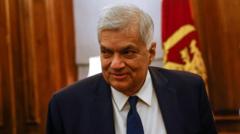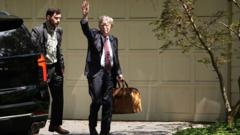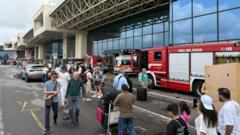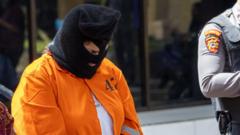In a striking turn of events within Sri Lankan politics, former president Ranil Wickremesinghe has been arrested over charges related to the misuse of funds during his tenure, with specific allegations regarding foreign trips. His case highlights ongoing issues of governance and accountability in the country's political arena.
Former President Ranil Wickremesinghe Arrested Over Alleged Misuse of Funds

Former President Ranil Wickremesinghe Arrested Over Alleged Misuse of Funds
Ranil Wickremesinghe's arrest marks a significant development in Sri Lanka's political landscape as he faces charges for alleged misuse of state funds during his presidency.
Former Sri Lankan president Ranil Wickremesinghe has been arrested by police on allegations of misusing state funds, marking a historic moment as he becomes the first former president in the country's history to face such legal challenges. The arrest occurred shortly after Wickremesinghe, 76, appeared at a magistrates' court in Colombo and provided a statement to the Criminal Investigations Department (CID).
Wickremesinghe's charges stem from three incidents associated with foreign trips he allegedly took while in office from 2022 to 2024. Specifically, it is reported that his arrest is linked to a stopover in the UK in 2023, where he attended a ceremony at the University of Wolverhampton on his return from a G77 summit in Cuba, which the CID claims was funded by the state despite being a private event. Wickremesinghe has denied these allegations.
During his presidency, Wickremesinghe made 23 foreign trips at a reported cost exceeding Rs 600 million (approximately $2 million). This investigation into his conduct had been progressing since June, when it was initially referred to a court, leading to the current legal proceedings.
Wickremesinghe's political journey has been notable, serving multiple terms as prime minister before assuming the presidency amidst a deep economic crisis that saw his predecessor, Gotabaya Rajapaksa, flee the country. Despite being credited with initiating recovery efforts for the crisis-hit nation, Wickremesinghe's career has been clouded by a long history of political challenges, especially after his party, the United National Party (UNP), significantly lost support in the 2020 elections.
As a prominent figure in Sri Lankan politics since 1977, Wickremesinghe's legal troubles highlight the growing scrutiny of political accountability in the country as it navigates its economic and social challenges. His arrest has stirred discussions among citizens about governance and transparency, raising important questions about the conduct of public officials in Sri Lanka.


















